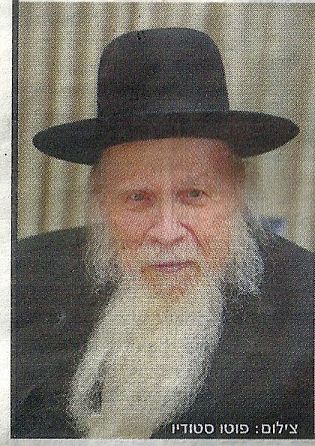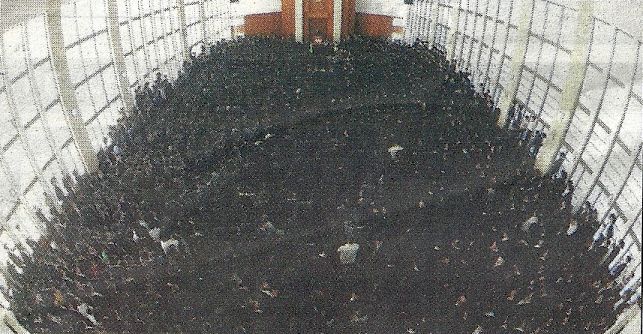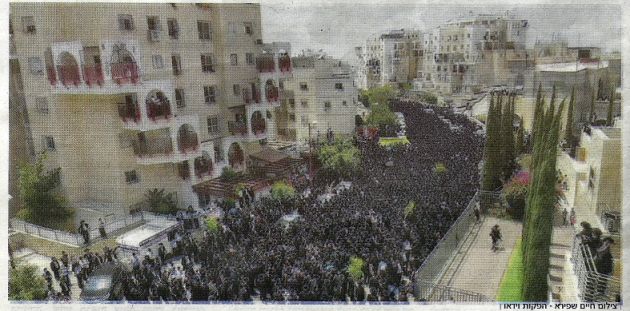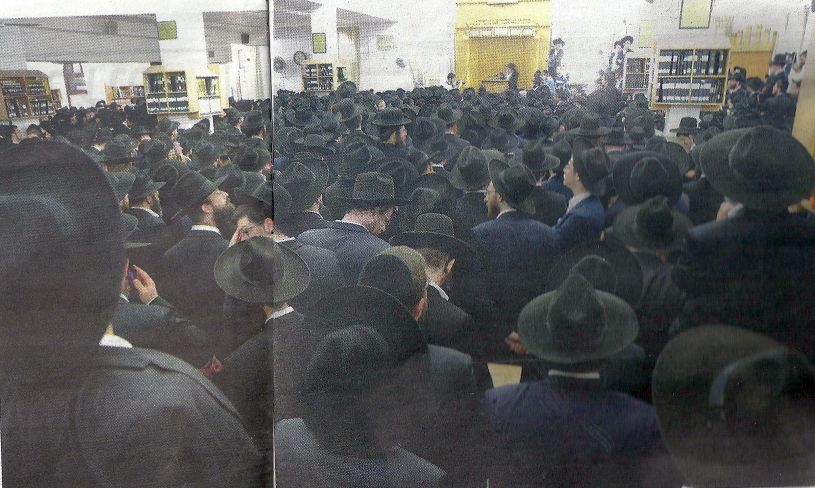HaRav Aryeh Leib Finkel zt"l

Shock and sadness were pronounced in the Torah community at the sudden passing of HaRav Aryeh Leib Finkel, a member of the Moetzes Gedolei HaTorah and rosh yeshiva of the Brachfeld branch of Mir Yeshiva late Tuesday night, 6 Av. HaRav Finkel was a teacher and guide of Mir Yeshiva and the Israeli Torah community as a whole for more than 50 years. He was niftar very suddenly on Tuesday night just before his 85th birthday.
HaRav Aryeh Leib Finkel was born on 14 Menachem Av, 5691 (1931) in Tel Aviv. His father, HaRav Chaim Zev Finkel, was the Mashgiach of Mir Yeshiva and the bechor of Maran HaRav Eliezer Yehuda Finkel, who was the rosh yeshiva of Mir Yeshiva and the son of the Alter of Slobodka, HaRav Nosson Tzvi Finkel. The mother of HaRav Aryeh was Rebbetzin Leah o"h, whose family name was Eibeschutz and who was a descendant of HaRav Yonoson Eibeschutz. Rebbetzin Leah was a daughter of Rebbetzin Chaila o"h, who remarried Maran HaRav Yosef Chaim Zonnenfeld zt"l.
After R' Aryeh was orphaned of his mother at a young age, and he therefore spent considerable time at his grandmother's house. Even though HaRav Zonnenfeld was niftar in Adar 5692, he later said that he learned much from his grandmother and the rest of the family. As the home of HaRav Yosef Chaim Zonnenfeld, it had been the source of guidance for the Yerushalayim community for many years.
He also imbibed the spirit of Slobodka in the house of his father, founded on the recognition of gadlus ho'odom. He grew up planted in the traditions of his father and grandfather, that were the foundations of the great Torah traditions of Slobodka and Mir. He was able to pass these on to further generations.
His father had asked his own brother, HaRav Avrohom Shmuel Finkel, to serve as the sandak of his bechor. He also asked someone to serve as the Kvater of the baby. This person was a Yehudi pashut. The Kvater had grown up in a community in which the honor of being the Kvater was coupled with the honor of being sandak, and after bringing in the baby a handed him over and sat down in the seat of the sandak, as he had grown to expect. The two brothers looked at each other and decided not to embarrass that Jew, and to let him serve as sandak. Years later HaRav Aryeh said that many seek to have a tzaddik or odom godol serve as a sandak at the bris of their children. However to Abba zt"l avoiding causing pain or embarrassment to a Jew was greater than anything else. This trait was also evident in the conduct of HaRav Aryeh throughout his life.
HaRav Aryeh used to quote his grandfather HaRav Eliezer Yehuda Finkel zt"l as saying that his own father, the Alter, had established two generations of Torah. By this he meant that the goal of the mussar efforts of his father the Alter was to establish generations of Torah, and at this he was successful. As a result, HaRav Eliezer Yehuda was exceptionally dedicated to the success of his talmidim, and he even used to fast for the merit of bochurim who he saw needed special assistance from Above. He remembered that his grandfather used to fast to this end quite often.
These youthful memories formed his later behavior when he became a marbitz Torah and was always exceptionally concerned about the success of his talmidim.
In his younger years he also had the opportunity to learn with his father zt"l, who used to learn regularly with his sons.
HaRav Chaim Zeev had come to Eretz Yisroel to be with and to help his grandfather, the Alter of Slobodka who had moved a substantial part of his yeshiva from Europe to Chevron. HaRav Chaim Zeev earned then trust of his grandfather, and he was involved in yeshiva affairs. After the riots, he moved to Yerushalayim with his wife whom he had wed just about six months previously.
In Cheshvan 5691 the yeshiva Heichal HaTalmud was founded in Tel Aviv. Four rabbonim joined forces to found this yeshiva: HaRav Yehoshua Zelig Diskin, HaRav Yosef Farber, HaRav Chaim Zev and another rov. HaRav Chaim Zev was at first appointed a ram in the new yeshiva, but eventually he rose to be rosh yeshiva. At the same time HaRav Chaim Zev was also the rosh yeshiva of Pleitas Sofrim, a yeshiva ketana founded for young boys who had come to Eretz Yisroel during World War II.
R' Aryeh was born in the summer following the founding of the yeshiva.
R' Aryeh later learned in the mechina of yeshivas Heichal HaTalmud of which his father was a ram and later rosh yeshiva. Later he went to learn in the newly founded Ponovezh Yeshiva, where he learned bechavrusa with his lifelong friend, HaRav Boruch Dov Povarsky ylct"a. R' Aryeh also used to spend time at Yeshivas Slobodka in Bnei Brak, where he became especially close to HaRav Yitzchok Isaac Sher zt"l.
He once said that his grandfather was involved in many Torah institutions of Eretz Yisroel and that he personally had been the shaliach of his grandfather to distribute financial support to many talmidei chachomim and Torah institutions. In 5706 his mother was niftar at a relatively young age.
As he matured he became known as a true ben aliyah, and on 8 Elul 5713 (1953) he married Rebbetzin Esther Gittel o"h, the daughter of HaRav Shmuel Aharon Yudelevitz zt"l.
In 5714 HaRav Yechezkel Levenstein, who had been the mashgiach of Yeshivas Mir for many years, since the yeshiva had been in Europe and spent the war years in Shanghai, left for Bnei Brak to serve as mashgiach of the Ponovezh yeshiva. After this the rosh yeshiva of Mir, HaRav Eliezer Yehuda, asked his son HaRav Chaim Zeev to serve as mashgiach of Mir yeshiva. R' Aryeh joined yeshiva Mir together with his father, and he was zoche to learn with his grandfather bechavrusa for many years.
R' Aryeh also became close with his uncle, HaRav Chaim Shmuelevitz zt"l, and he used to attend his shiurim and learn with him bechavrusa. He also learned with his cousin HaRav Nochum Partzovitch zt"l, who often said that he had gained a lot from learning with R' Aryeh, because of his straight thinking, in how to learn the basics of the gemora. HaRav Nochum often sent bochurim who were having problems in learning to R' Aryeh to learn with him and hear his shiurim.
HaRav Aryeh began giving shiurim basically right after he married, and he continued saying shiurim for more than sixty years.
His grandfather HaRav Eliezer Yehuda was niftar on 19 Tammuz 5725 (1965) and his father was niftar just two months later on 18 Elul at the age of 61. Not long after that his uncle, HaRav Chaim Shmuelevitz, spoke with him at length one leil Shabbos, and tried to convince him that, despite his relative youth (he was 34 at the time) he should nonetheless take his father's place in saying mussar shmuessen in the yeshiva.
HaRav Aryeh's son HaRav Binyomin ylct"a later said that the real result of that long conversation was that HaRav Chaim was convinced that he himself should start saying shmuessen. During the conversation, HaRav Aryeh declined to say shmuessen and suggested that HaRav Chaim was more qualified. HaRav Chaim replied that he was too busy with his shiurim and learning and he is not really qualified to speak about mussar and Yirah. R' Aryeh argued forcefully that with his great abilities he could do both things very well, and he pleaded with R' Chaim to fill his father's place in saying sichos in the yeshiva.
The rest, as they say, is history. R' Chaim began saying mussar shmuessen in the yeshiva and several years of those shmuessen were collected into Sichos Mussar which has become a yeshiva classic. This volume was in fact edited by R' Aryeh and the son of R' Chaim, R' Refoel Shmuelevitz zt"l.
However, with the passing of HaRav Chaim Shmuelevitz in 5739, R' Aryeh began saying weekly shmuessen in Yeshivas Mir, a tradition which he kept up until very recently.
When HaRav Nochum Partzovitch became ill and could not continue to say shiurim, the Rosh Yeshiva HaRav Beinush Finkel zt"l asked him to substitute. Since he had been given special preparation shiurim for HaRav Nochum's shiur, it was felt that he could continue along the same path.
In Elul 5759, he was asked by the rosh yeshiva HaRav Nosson Tzvi Finkel zt"l to be the founding head of the branch of the yeshiva known as Mir-Brachfeld. This branch was very successful and has earned a place as one of the leading yeshivas in Eretz Yisroel in its own right.
He used to daven before the omud on the yomim noraim, and for many it was the highlight of those days. He used to arrive early throughout the year for davening.
He had special insight and gave wide counsel to many organizations. In 5760 Maran Rosh Hayeshiva HaRav Shteinman asked him to serve as a member of the Moetzes Gedolei HaTorah. But he refused, saying that the Rosh Yeshiva of Mir should instead be appointed. After the passing of HaRav Nosson Tzvi, he took his place on the Moetzes.
He was head of the organization Bnei Aliya Aliyas Beis Chananya, and used to attend the kennesim of chizuk. He was a member of the board of Mifal HaShas, and also a member of the presidium of the Vaad Hayeshivos. He was also a member of the presidium of Kuppas HaIr, one of the great tzedokos of our time.
He was also the founding advisor of the worldwide organization Ovos Ubonim, and they took his guidance every step of their way.
In recent years he spent most of his time in his home next to Mir-Brachfeld, and people used to come to him all the time for advice and counsel, including many residents of Kiryat Sefer.
He had been ill lately, but he kept up his regular routine, including saying shiurim in his home.
On Tuesday night he met with a delegation from Mifal HaShas that came to ask to hold their annual gathering in his home on Friday. He agreed and signed a letter to that effect. Then he lay down and suddenly he had a heart attack and returned his soul to his Maker.

The levaya in the Mir-Brachfeld yeshiva
The levaya was held the next day, starting in the Mir-Brachfeld yeshiva. The first speaker was HaRav Noam Alon, the rosh yeshiva. He was followed by the rov of Kiryat Sefer, HaRav Meir Kessler. (Brachfeld is a neighborhood of Kiryat Sefer-Modiin Illit.) The next speaker was HaRav Avrohom Yitzchok Barzel, a ram in the yeshiva.
The speaker after him was HaRav Tzvi Partzovitch, one of the roshei yeshiva. HaRav Partzovitch said that his father Reb Nochum said that R' Aryeh was his rebbe in pshat. He also said that R' Aryeh was the last of those who exemplified the hatznei'a leches of Slobodka, the special talent of remaining tzonu'a in the midst of publicity.
The next to speak was the Admor of Tzans, the head of the Mifal HaShas. After his was HaRav Reuven Hoechster, the mashgiach of Mir-Brachfeld. The final speaker at that location was HaRav Yisroel Zicherman, the rav of the Brachfeld neighborhood.

The levaya in the streets of Kiryat Sefer
After that the levaya proceeded to Yerushalayim, as tens of thousands of Modi'in Illit residents accompanied the aron as the Rosh Yeshiva zt"l left their city for the last time.

The levaya in the Mir yeshiva in Yerushalayim
The first speaker at the main Mir Yeshiva in Yerushalayim was the Rosh Yeshiva, HaRav Eliezer Yehuda Finkel. He was followed by the niftar's friend of many years, HaRav Boruch Dov Povarsky, who was overcome with tears. Next to speak was his brother-in-law the mashgiach of Mir, HaRav Aharon Halevi Chodosh. Then his brother-in-law, HaRav Avigdor Nevenzahl, rov of the Old City of Jerusalem, spoke.
Following him was his eldest son, HaRav Binyomin, who said that when his mother, his father's first wife, the wife of his youth, passed away in 5752, when they came to cover her with earth at the burial, his father turned to him and said, `We are now about to perform the mitzvah of kevurah. A mitzvah like any other mitzvah. For me this is a mitzvah just like Succah. Just like it says there, "Vesomachto bechagecho," we have to be besimcha here in doing this mitzvah.' This was in spite of the tremendous pain and sorrow he felt that the passing of his faithful wife, who had helped him accomplish so much.
The burial was no Har Hamenuchos.
R' Aryeh is survived by his second wife who stood by him for many years, his sons HaRav Binyomin, HaRav Nosson Tzvi and HaRav Chaim Zeev, his sons-in-law HaRav Saar Maizel and HaRav Avrohom Shapira, as well as many grandchildren, great-grandchildren and thousands of talmidim.
* * *
Writing in the paper the next day, HaRav Naftoli Falk, head of Ovos Ubonim, wrote that one time when they were suffering under financial pressures, they had an offer of a very large grant from the Ministry of Culture. HaRav Falk said that consulted with HaRav Aryeh about the offer and he was insistent that they turn it down. They were very surprised as they knew how strongly HaRav Aryeh felt their difficulties, and they said why are they different from the yeshivas who benefit from government support. HaRav Aryeh answered, "The holy yeshivos are an absolute necessity and for a necessity one must do whatever one can. But Ovos Ubonim is just an additional good thing. Something which is just additional, should only be done if it is able to be done like a pure cruse of oil."




